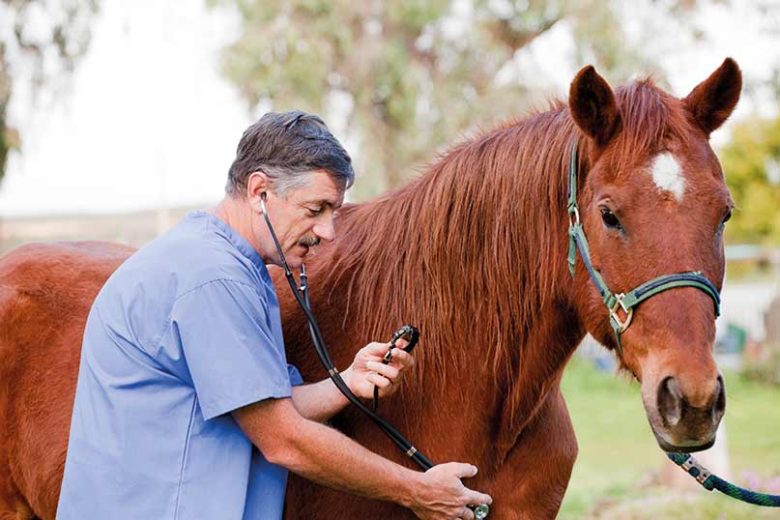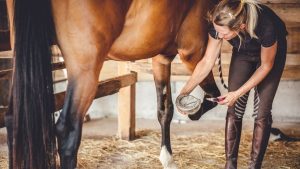Horses are beautiful animals that have been important to humans throughout history, from transportation and agriculture to sports and recreation. That is why taking care of their health is very important for their well-being and work. This article aims to give you a comprehensive understanding of common equine health problems by discussing how to avoid them, their symptoms, and the different treatments.
1. Problems With the Digestive System
The intestinal tract is one of the most important parts of your horse’s health. Colic is a broad term for stomach pain that occurs frequently. Some of the causes of this condition include intestinal blockage, gas buildup, or changes in diet. To prevent colic, make sure your horse has access to clean water, a stable diet, and regular exercise. Scratching, rolling, and showing signs of pain are all signs. Early detection is important and your vet may need to use medication or surgery to help.
2. Lung Condition
Horses can develop breathing problems, such as equine asthma, also called ‘vomiting’. Dust, mold, and irregular airflow can worsen breathing problems. Coughing, nasal congestion, and difficulty breathing are all symptoms. Breathing problems can be avoided by properly managing the stable, allowing air circulation, and limiting exposure to dust. Treatment with bronchodilators and corticosteroids can be carried out under the supervision of a doctor.
3. Joint and Flaccid Problems
Limping is a sign of lameness, often caused by joint problems. Lameness can be caused by arthritis, joint infections, and accidents. Joint problems can be prevented by exercising regularly, eating well, and walking on the right surface. If your pet is limping, take him to a veterinarian immediately so he can accurately diagnose the problem and begin treatment, which may include rest, medication, or, in the worst-case scenario, surgery.
4. Healthy Teeth
Horses often develop problems with their teeth, which can affect their overall health. To avoid problems such as uneven wear and pain, it is important to carry out regular dental check-ups and ‘floats’, which involve smoothing out sharp spots. Difficulty chewing, weight loss, and behavioral changes are all signs of dental problems. Dental problems should be treated immediately by a doctor familiar with equine dentistry.
5. Parasitic Infection
Parasites inside and outside the horse’s body, such as worms and ticks, always pose a threat to the horse’s health. Regular parasite removal, good manure management, and keeping fields clean can all help. Different parasites can cause different symptoms, such as weight loss, dull hair, and behavioral changes. Talk to your vet about developing a good deworming program based on your horse’s needs.
6. Hoof Problems
A horse’s overall health depends on the care of its feet. Thrush, abscesses, and laminitis can occur on the feet. Taking care of your hooves with regular cleaning, trimming, and proper shoeing can help prevent problems. Lameness, changes in movement, and reluctance to put weight on one leg are all signs of hoof problems. For proper head care, you should immediately consult a farrier or veterinarian.
7. Problems With Metabolism
Older horses are more likely to develop metabolic diseases such as equine metabolic syndrome (EMS) and Cushing’s disease. These conditions disrupt the way hormones work and can lead to weight gain, foot pain, and insulin resistance. To control and treat symptoms, treatment includes diet, regular exercise, and visits to the vet.
8. Have Skin Problems
Horses can develop fungal diseases, allergies, dermatitis, and other skin problems. Many skin problems can be avoided by taking good care of your appearance, checking your face regularly, and living in a clean environment. Hair loss, itching, and changes in skin color or texture may be symptoms. Talk to your vet for a proper diagnosis and appropriate treatment, which may include medicated baths, ointments applied to the skin, or pills your pet swallows.
9. Healthy Thoughts and Behavior
Stress, tension, and behavioral problems can occur in horses just as they do in humans. Behavioral changes can be caused by environmental changes, a lack of social contact, or deeper health problems. Providing horses with a regular schedule, opportunities to socialize, and a good living environment are important for maintaining good mental health. If your horse is behaving poorly, you should seek help from your veterinarian or an equine behavior expert.
Conclusion
As a good horse owner, you need to understand and deal with common health problems in your horse. You can improve your horse’s overall health by eating a balanced diet, exercising, and keeping your living area clean. It’s important to spot the signs early and seek veterinary help right away to prevent minor problems from getting worse. You can take an active interest in the care and well-being of your horse, ensuring a long-term, healthy, and happy relationship with your horse.
FAQs
1. What are the most common symptoms of colic in horses?
Dogs with colic will often claw, roll around, show signs of pain, and change their behavior or hunger.
2. How can I prevent my horse from getting colic?
To prevent your horse from getting colic, make sure he has clean water, a steady supply of food, regular exercise, and a stable schedule.
3. What are the signs that a horse’s lungs are not functioning properly?
Coughing, nasal congestion, and difficulty breathing are all signs of respiratory problems.
4. How can I prevent my horse from developing breathing problems?
Proper stable management, ensuring air circulation, and limiting dust exposure can all help prevent respiratory diseases.
5. What is the horse’s weakness? Why does this weakness occur?
Lameness is a strange gait that can be caused by arthritis, infection, or joint damage.
6. What can I do to prevent my horse from becoming lame?
A healthy diet, regular exercise, and a good gait can all help you prevent limping. If your horse is lame, you should consult a veterinarian immediately.



